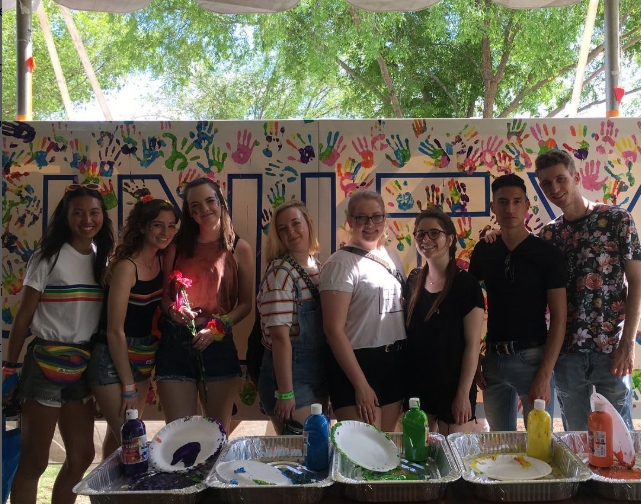
Diversity at Grand Canyon University
Sexuality and gender awareness club highlights and celebrates LGBTQ+ students
By Gracie DeVinney
PHOENIX- Grand Canyon University strives to create a welcoming and safe environment for all students. However, several students apart of the LGBTQ+ community find it difficult to gain acceptance on campus. Those part of the community feel oppressed and have a hard time finding their place due to multiple aspects at GCU that negatively affect the community.
The treasurer of SAGA, Phoebe Caperon, believes GCU becomes more inclusive every year but there are still things the university could improve upon to help ensure all students feel accepted.
Fortunately, the university allowed students to form a sexuality and gender awareness club, which helped make incredible strides in promoting a more diverse campus.
SAGA was founded in 2018 with the mission of creating a safe, inclusive space for the LGBTQ+ community. Since its inception, it has been a beacon of support, offering students a chance to authentically express themselves and connect with others who share similar experiences. The club has fostered a culture of open dialogue, where students can engage in meaningful, honest conversations. Through its vibrant events, SAGA has become a source of joy and empowerment for everyone who participates, creating lasting connections and a sense of belonging.
The president of SAGA, Amanda Brunjes says, “Queer students are not something to be erased, but something to be celebrated as a core part of this campuses diversity and a core part of its student body.”
The club frequently holds meetings for members to attend and enjoy. The meetings range from discussions about relationships, influential LGBTQ+ activists, and mental health. SAGA is also a place to relax and have fun together. They also host game nights, hobby nights, karaoke, and speed-friending events to help students interact and connect.
Students commonly stick around after the meeting, laughing, and chatting with one another. These are pivotal moments when members open up to each other, forming their own community. Treasurer Caperon shares it is a beautiful sight to witness because she understands how lonely college can be for students, especially those in the LGBTQ+ community.
An example of one of SAGA’s most anticipated events is their annual ‘You are loved’ sidewalk chalk event. The chalk event provides a great opportunity to lift one another up and celebrate equality. This year, it took place on March 4 outside of GCU’s student union. Hundreds of students walking by took the time to stop and write a loving and heartfelt message. Some of these messages included, “allow yourself to grow,” “you are a fighter,” “God loves you,” “you are loved,” “treat yourself kindly,” “love is love.”
SAGA looks forward to this event every year because it brings everyone on campus together, regardless of their religion, gender, sexuality, race, etc. It produces an immeasurable amount of hope, love, and acceptance for those who need it.
“I hope in the future for SAGA to interact more with the student body as a whole,” Brunjes says. “Encouraging an environment where we have more in common than we do different, we can all be friends, get along, and dismantle the harmful stereotypes or preconceived notions.”
Events like these ignite crucial conversations that bring students together, offering LGBTQ+ individuals a space to connect and feel seen. This is vital in preventing feelings of isolation and rejection. Research from the Postsecondary National Policy Institute shows that nearly 10% of high school students who experienced harassment due to their sexuality chose not to pursue higher education—a stark reminder of the importance of supportive spaces.
While college marks an exciting new chapter, it can also be a stressful time for students still figuring out who they are, especially if they don't feel they belong. To address this, over 200 campuses across the country have sexuality and gender awareness clubs, which play a crucial role in fostering community and support. Studies from the National Institute on Minority Health and Health Disparities confirm that these organizations have a powerful, positive impact on students’ mental health, making them feel safer and more accepted on campus.
GCU junior, Sophie Price, has been a member of SAGA for over a year. These meetings and events have become a highlight in their lives. Price recalls having a difficult time connecting with their peer’s freshman year, due to being queer. This caused them to feel lonely and out of place. SAGA greatly improved Price’s college experience and believes the club is an essential part of GCU’s campus.
“I know I am going to be safe; I know I am going to be validated,” Price says. “I know I am going to feel respected, loved, and seen. It feels nice to feel loved by a group of people.”
Post a comment